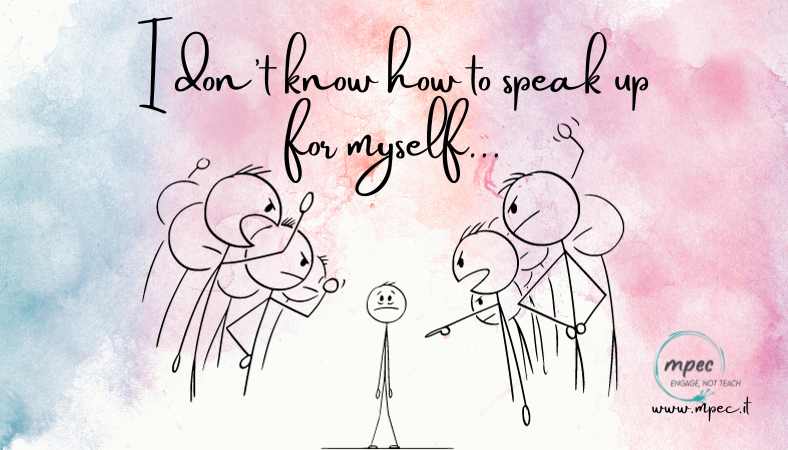Welcome to our insightful discussion inspired by TED Talks! Today’s topic is both challenging and essential: “Why Speaking Up For Yourself Can Be A Challenge?” In this session, we’ll explore the various aspects that make self-advocacy difficult, from cultural backgrounds to personal fears. This is a chance to understand the barriers to assertive communication and learn how we can overcome them. Let’s dive into the art of finding our voice and using it effectively.
Prepared for you by: My Personal English Coach
Non sai da dove iniziare?
Not sure where to start?
Round 1: Understanding the Challenge
- “Have you ever held back from speaking your mind in a crucial moment? What stopped you?” ( hold back means to not do something, often because of fear or because you do not want to make a bad situation worse)
- “In what situations do you find it hardest to speak up for yourself?” (speak up for someone/something = to support someone or something, especially by saying good things about him, her, or it: She has often spoken up for the rights of working mothers.)
Key Grammar/Vocabulary Expressions:
- Hesitate (e.g., “I hesitate to say…”)
- Self-doubt (e.g., “Self-doubt often holds me back…”)
- Cultural influences (e.g., “Cultural influences sometimes dictate…”)
- Assertive vs. aggressive (e.g., “There’s a fine line between being assertive and aggressive…”)


Round 2: Overcoming Barriers
- “What strategies do you use to overcome fear or anxiety when speaking up?”
- “Can you share a time when you successfully advocated for yourself? What made it successful?”
Key Grammar/Vocabulary Expressions:
- Overcome (e.g., “To overcome my fear, I…”)
- Empowerment (e.g., “Feeling empowered, I…”)
- Confidence building (e.g., “Building confidence is key to…”)
- Voice your thoughts (e.g., “Voicing my thoughts helps me…”)
Round 3: Learning from Others
- “Are there public figures or TED speakers who inspire you to speak up? What about them inspires you?”
- “How can we learn from others’ experiences in speaking up for themselves?”
Key Grammar/Vocabulary Expressions:
- Inspiration (e.g., “I find inspiration in…”)
- Role models (e.g., “My role model in assertiveness is…”)
- Learning from (e.g., “Learning from others, I…”)
- Influential speakers (e.g., “Influential speakers like… have taught me…”)

Remember – there is always more! Here is your Follow Up Video:
#SpeakUp #SelfAdvocacy #TEDTalks #CommunicationSkills #PersonalDevelopment #Assertiveness #ConfidenceBuilding #PublicSpeaking #VoiceYourOpinion #Empowerment #OvercomingFears #AssertiveCommunication #SelfExpression #EffectiveCommunication #PersonalGrowth #SelfConfidence #FacingChallenges #TEDInspiration #AssertivenessTraining #FindingYourVoice
#ParlareApertamente #AutoRappresentazione #TEDTalks #CompetenzeComunicative #SviluppoPersonale #EssereAssertivi #CostruzioneDellaFiducia #ParlareInPubblico #EsprimiLaTuaOpinione #Empowerment #SuperareLePaure #ComunicazioneAssertiva #Autoespressione #ComunicazioneEfficace #CrescitaPersonale #Autostima #AffrontareSfide #IspirazioneTED #FormazioneSullAssertività #TrovareLaPropriaVoce







